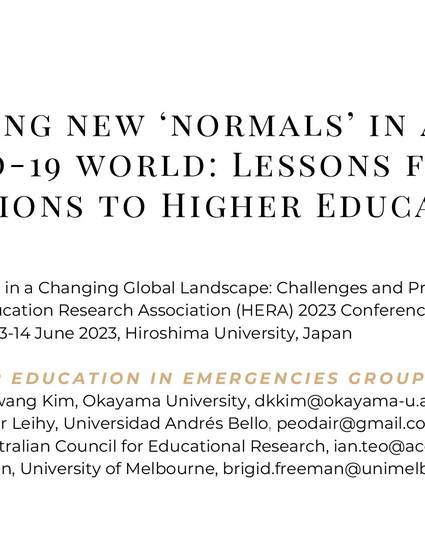
Presentation
Negotiating new 'normals' in a post- covid-19 world: Lessons for Disruptions to Higher Education
Higher Education in a Changing Global Landscape: Challenges and Prospects Higher Education Research Association (HERA) 2023 Conference
(2023)
Abstract
As has been well established, the COVID-19 pandemic impacted higher education systems and institutions globally in numerous ways. At the systemic level, government health directives resulted in campus closures, social distancing, and vaccination regimes, while border control policy changes interrupted international flows. At the institutional level, higher education institutions optimised online modes and modalities for teaching, assessment, and student support; innovated to accommodate interruptions to research and professional activities; fast-tracked decision-making; and restructured staffing profiles and budgets. While the impacts of pandemic-induced changes will reverberate over forthcoming years, they also reveal lessons that can be used to inform preparations for future disruptions to higher education. This presentation will outline the Higher Education in Emergencies Domains (HEED) framework (Leihy et al, 2022), developed from reviews of the literature relating to higher education-related responses to the COVID-19 pandemic. Analysis of this literature, beginning from March 2020, revealed nine, inter-related domains and corresponding domain indicators. These domains are: geopolitics and jurisdictions; system regulation; financing; infrastructure; teaching and learning; research and research training; pathways and portals in and out; governance and leadership; and human resources. To support the work of higher education stakeholders preparing for an increasingly uncertain future, these domains can be considered alongside a Response-Recovery-Prevention-Preparation (RRPP) risk management cycle. The inclusion of this cycle enables higher education stakeholders to monitor decisions made against the nine domains and domain indicators across risk management phases. In the shorter term, this conceptualisation of the HEED framework will enable higher education stakeholders to review the various ways in which systems and institutions are recovering from the pandemic. More broadly, reflecting on the ways systems and institutions responded to, and recovered from the COVID-19 pandemic, the HEED framework may be used by higher education stakeholders to conceptualise comprehensive preparations for future disruptions to higher education.
Keywords
- higher education,
- disruption
Disciplines
Publication Date
June 13, 2023
Location
Hiroshima University, Japan
Citation Information
Dong Kwang Kim, Peodair Leihy, Ian Teo and Brigid Freeman. "Negotiating new 'normals' in a post- covid-19 world: Lessons for Disruptions to Higher Education" Higher Education in a Changing Global Landscape: Challenges and Prospects Higher Education Research Association (HERA) 2023 Conference (2023) Available at: http://works.bepress.com/ian-teo/23/
